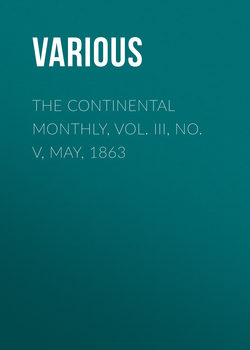Читать книгу The Continental Monthly, Vol. III, No. V, May, 1863 - Various - Страница 6
A MERCHANT'S STORY
CHAPTER XXII
ОглавлениеI found Selma plunged in the deepest grief. The telegram which informed her of Preston's death was dated three days before (it had been sent to Goldsboro for transmission, the telegraph lines not then running to Newbern), and she could not possibly reach the plantation until after her father's burial; but she insisted on going at once. She would have his body exhumed; she must take a last look at that face which had never beamed on her but in love!
Frank proposed to escort her, but she knew he could not well be spared from business at that season; and, with a bravery and self-reliance not common to her years and her sex, she determined to go alone.
Shortly after my arrival at the house, she retired to her room with Kate, to make the final arrangements for the journey; and I seated myself with David, Cragin, and Frank, in the little back parlor, which the gray-haired old Quaker and his son-in-law had converted into a smoking room.
As Cragin was lighting his cigar, I said to him:
'Have you heard the news?'
'What news?'
'The dissolution of Russell, Rollins & Co.'
'No; there's nothing so good stirring. But you'll hear it some two years hence.'
'Read that;' and I handed him the paper which Hallet had signed.
'What is it, father?' asked Frank, his face alive with interest.
'Cragin will show it to you, if it ever gets through his hair. I reckon he's learning to read.'
'Well, I believe I can't read. What the deuce does it mean?'
'Just what it says—Frank is free.'
The young man glanced over the paper. His face expressed surprise, but he said nothing.
'Then you've heard how things have been going on?' asked Cragin.
'No, not a word. I've seen that Hallet was abusing the boy shamefully. I came on, wanting an excuse to break the copartnership.'
'Do you know you've done me the greatest service in the world? I told Hallet, the other day, that we couldn't pull together much longer. He refused to let me off till our term is up; but I've got him now;' and he laughed in boyish glee.
'Of course, the paper releases you as well as Frank. It's a general dissolution.'
'Of course it is. How did you manage to get it? Hallet must have been crazy. He wasn't John Hallet, that's certain!'
'The genuine John, but a little excited.'
'He must have been. But I'm rid of him, thank the Lord! Come, what do you say to Frank's going in with me? I'll pack him off to Europe at once—he can secure most of the old business.'
'He must decide about that. He can come with me, if he likes. He'll not go a begging, that's certain. He'll have thirty thousand to start with.'
'Thirty thousand!' exclaimed Frank. 'No, father, you can't do that; you need every dollar you've got.'
'Yes, I do, and more too. But the money is yours, not mine. You shall have it to-morrow.'
'Mine! Where did it come from?'
'From a relative of yours. But he's modest; he don't want to be known.' 'But I ought to know, I thought I had no relatives.'
'Well, you haven't—only this one, and he's rich as mud. He gave you the five thousand; but this is a last instalment—you won't get another red cent.'
'I don't feel exactly like taking money in that way.'
'Pshaw, my boy! I tell you it's yours—rightfully and honestly. You ought to have more; but he's close-fisted, and you must be content with this.'
'Well, Frank,' said Cragin, 'what do you say to hitching horses with me? I'll give you two fifths, and put a hundred against your thirty.
'What shall I do?' said Frank to me.
'You'd better accept. It's more than I can allow you.'
'Then it's a trade?' asked Cragin.
'Yes,' said Frank.
'Well, old gentleman, what do you say—will you move the old stool?' said Cragin, addressing David.
'Yes; I like Frank too well to stay with even his father.'
In the gleeful mood which had taken possession of the old man, the words slipped from his tongue before he was aware of it. He would have recalled them on the instant, but it was too late. Cragin caught them, and exclaimed:
'His father! Well, that explains some riddles. D—d if I won't call the new firm Hallet, Cragin & Co. I've got him all around—ha! ha!'
Frank seemed thunderstruck. Soon he plied me with questions.
'I can say nothing; I gave my word I would not. David has betrayed it; let him explain, if he pleases.'
The old bookkeeper then told the young man his history, revealing everything but the degradation of his poor mother. Frank walked the room, struggling with contending emotions. When David concluded, he put his hand in mine, and spoke a few low words. His voice sounded like his mother's. It was again her blessing that I heard.
Two weeks afterward, the old sign came down from the old warehouse—came down, after hanging there three quarters of a century, and in its place went up a black board, on which, emblazoned in glaring gilt letters, were the two words,
'John Hallet.'
On the same day, the busy crowd passing up old Long Wharf might have seen, over a doorway not far distant, a plainer sign. It read:
'Cragin, Mandell & Co.'
